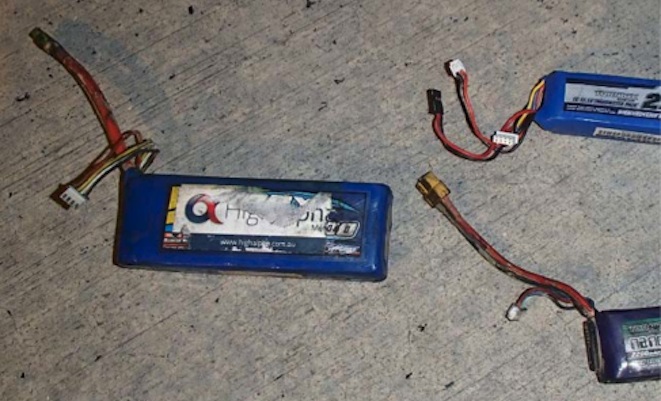
The Australian Government has issued a fresh warning to travellers about the dangers of carrying lithium batteries after one exploded in a passenger’s carry-on bag at Sydney Airport.
Minister for Infrastructure and Transport Darren Chester said incident took place on board an aircraft while it was on the ground at the airport. While there no damage was caused to the aircraft, the Minister said several passengers reported “feeling ill” after the incident.
“This incident serves as a warning to the dangers of carrying these batteries on flights,” Chester said in a statement.
“We are all reminded before boarding of potential items, including loose lithium ion batteries, that should not fly.
“The Australian Government has in place regulations designed to ensure the safety of passengers, but it is also everyone’s responsibility to declare dangerous items.
Lithium batteries, which can short-circuit and catch fire when damaged or not carried correctly, have topped the Civil Aviation Safety Authority’s (CASA) “Top 10 Least Wanted Goods” list for the past two years.
CASA recommends carrying spare lithium batteries in carryon luggage only and ensuring they are protected from short-circuiting through keeping them in their original packaging and taping over exposed terminals.
Further, airlines around the world have stepped up on-board announcements regarding the carriage of batteries on flights and banned lithium ion batteries from being transported as cargo.
In 2015, an International Civil Aviation Organisation (ICAO) working paper noted there was a “growing body of test data” that existing cargo compartment fire protection systems certified to US or European regulations were unable to suppress or extinguish a fire involving significant quantities of lithium batteries.
The working paper, which stated the position of the International Coordination Council for Aerospace Industry Association (ICCAIA) and the International Federation of Airline Pilots Association (IFALPA), said “continuing to allow the carriage of lithium batteries within today’s transport category aircraft cargo compartments is an unacceptable risk to the air transport industry”.
“ICCAIA recommends that appropriate packaging and shipping requirements be established to safely ship lithium ion batteries as cargo on aircraft and that high density packages of lithium ion batteries and cells not be transported as cargo on passenger aircraft until such time as safer methods of transport are established and followed,” the working paper said.
Chester said all travellers should read the warnings about dangerous items when checking in for their flight and surrender those items before boarding “for the safety of everyone on the flight”.
“In Australia, the Civil Aviation Safety Authority works closely with airlines and the aviation industry to minimise the risk of in-flight incidents,” Chester said.
“In recent years it has increased the focus on the carriage of personal electronic devices.”
Further information on carrying batteries on board a flight can be found on the CASA website.
The regulator has also developed a “Can I pack that?” dangerous goods (DG) app to inform travellers about how dangerous some everyday objects are when taken on board an aircraft, as well as any special packing instructions.
It has also published a YouTube video on lithium batteries:
Meanwhile, the International Air Transport Association (IATA) and industry bodies for rechargeable and lithium batteries have called on governments around the world to better enforce lithium battery safety regulations.
IATA, the US Rechargeable Battery Association, the European Advanced Rechargeable and Lithium Battery Association, the Global Shippers Forum and International Air Cargo Association have written a joint-letter to governments and regulators around the world to calling for “significant fines and custodial sentences to be imposed on those who circumvent the regulations”.
Further, the letter noted the “danger posed by the wilful disregard of the international regulations by rogue manufacturers and shippers”, and urged governments to close the legal loopholes that prevented serial offenders from prosecution.
“Safety is aviation’s top priority,” IATA chief executive Tony Tyler said in a statement.
“Airlines, shippers and manufacturers have worked hard to establish rules that ensure lithium batteries can be carried safely. But the rules are only effective if they are enforced and backed-up by significant penalties.
“Government authorities must step up and take responsibility for regulating rogue producers and exporters. And flagrant abuses of dangerous goods shipping regulations, which place aircraft and passenger safety at risk, must be criminalized.”
IATA said a lack of enforcement was increasing pressure on airlines and regulators to unilaterally ban all forms of lithium battery shipments from aircraft.
“This would add to the cost of global supply chains and consumer goods, and encourage those who flout the law to increase mislabelling of batteries, further increasing safety and security risks,” IATA said.
Also, a ban in the shipment of lithium ion batteries on board aircraft would “put lives at risk by slowing delivery of life-critical and life–enhancing medical equipment and jeopardize the security of many countries because a large number of military applications are powered by lithium batteries,” US Rechargeable Battery Association executive director George Kerchner said.
















Scotty
says:The scary thing with these things is that you never know where or when one will decide to ignite and if so, they are notoriously hard to extinguish as they are self feeding through to destruction… sheesh..!! And the damn things are everywhere and getting more popular every day..
Bob Richard
says:When events like this occur it is important to conduct an investigation into the root cause of the incident. There are a number of reasons that could have contributed to the event. For instance, the battery could have been abused (e.g. damaged, exposed to extreme temperatures, overcharged, etc.) or it could be one that is poorly manufactured and not appropriately safety tested. To simply conclude that all lithium batteries should be banned from being shipped as cargo on aircraft is short sited.
http://blog.labelmaster.com/lithium-battery-enforcement-we-need-a-level-playing-field-before-new-restrictions/